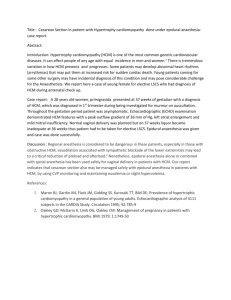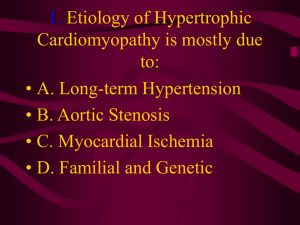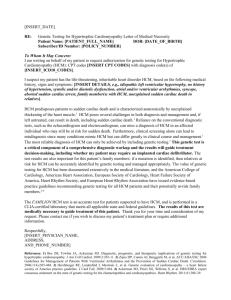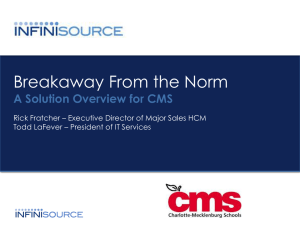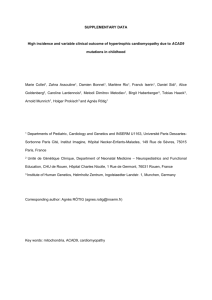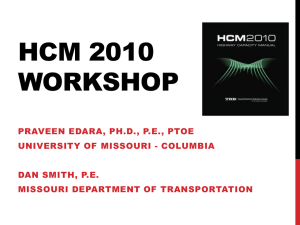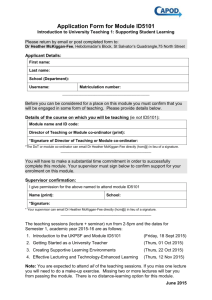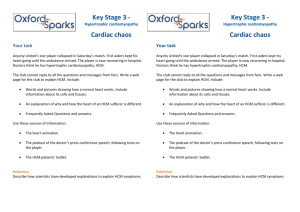Word - Oxford Sparks
advertisement
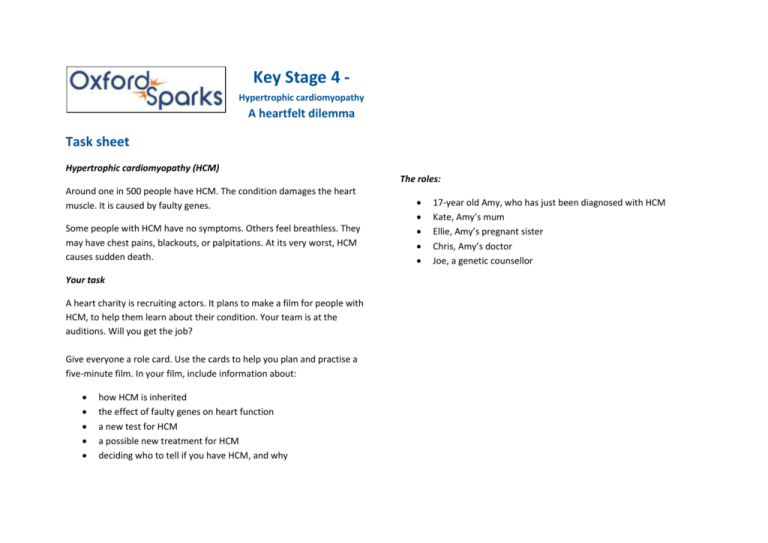
Key Stage 4 Hypertrophic cardiomyopathy A heartfelt dilemma Task sheet Hypertrophic cardiomyopathy (HCM) The roles: Around one in 500 people have HCM. The condition damages the heart muscle. It is caused by faulty genes. Some people with HCM have no symptoms. Others feel breathless. They may have chest pains, blackouts, or palpitations. At its very worst, HCM causes sudden death. Your task A heart charity is recruiting actors. It plans to make a film for people with HCM, to help them learn about their condition. Your team is at the auditions. Will you get the job? Give everyone a role card. Use the cards to help you plan and practise a five-minute film. In your film, include information about: how HCM is inherited the effect of faulty genes on heart function a new test for HCM a possible new treatment for HCM deciding who to tell if you have HCM, and why 17-year old Amy, who has just been diagnosed with HCM Kate, Amy’s mum Ellie, Amy’s pregnant sister Chris, Amy’s doctor Joe, a genetic counsellor Key Stage 4 - Key Stage 4 - Hypertrophic cardiomyopathy hypertrophic cardiomyopathy A heartfelt dilemma A heartfelt dilemma Peer assessment Peer assessment Tick the table to show what the role play covered. Tick the table to show what the role play covered. Issue Did the group address this issue? Did the group make it easy to understand? Issue How HCM is inherited How HCM is inherited The effect of faulty genes on heart function The effect of faulty genes on heart function A new test for HCM A new test for HCM A possible new treatment for HCM A possible new treatment for HCM Deciding who to tell if you have HCM, and why Deciding who to tell if you have HCM, and why Did the group address this issue? Did the group make it easy to understand? 1. What were the two best things about the performance? ☺ ☺ 1. What were the two best things about the performance? ☺ ☺ 2. 2. Suggest one improvement. Suggest one improvement. Role 1 Role 2 Name: Amy Age: 17 Occupation: Student Hobby: Playing sport Name: Kate Age: 49 Occupation: Teacher Hobby: Running You collapsed last month during a sports match. A first aider did CPR, keeping you alive until you reached hospital. You are Amy’s mum. You go with Amy to the hospital doctor. You have two questions: At hospital, you had several tests. The tests showed that part of your heart muscle is thicker than normal. Your heart uses energy inefficiently. It must work harder than normal to pump blood around your body. Hospital doctors think you might have HCM. But they are not sure. They booked you in for some tests, including an MRI scan and an echocardiogram. You are returning to hospital for these tests. You have lots of questions: How do the tests show if I have HCM? Is there any treatment? How do faulty genes affect the function of my heart? The tests show that you have HCM. Your doctor is wondering whether to test blood from other members of your family to see if they are likely to have HCM. You visit a genetic counsellor. You have one question for the genetic counsellor. How did I inherit HCM? Will Amy collapse again? Should she stop playing sports? You are worried that other family members have HCM. You go with Amy to see the genetic counsellor. You discuss who to tell about Amy’s HCM, and whether they should they have tests for HCM: Might Amy’s 15-year old brother, Jack, have HCM? Who decides if he has the tests – him or me? I’m 49. Wouldn’t I know by now if I had HCM? Do I need the tests? I’m worried about my partner, Amy’s step dad. Could he have HCM? Is it infectious? What about my ex, Amy’s and Jack’s dad? He gave them half their genes. Is it his fault? Role 3 Role 4 Name: Ellie Age: 25 Occupation: Carpenter Hobby: Watching TV soaps Name: Chris Age: 35 Occupation: Hospital doctor specialising in HCM Hobby: Singing in a band You are Amy’s pregnant older sister. You visit the genetic counsellor with Amy and your mum. Use this information to help you answer Amy and Kate’s questions. You have several questions: If I have HCM, will my baby have it too? Can the condition travel in my blood to the foetus? Should I tell my partner, the baby’s father, that Amy has HCM? Does he need the test? You have also printed a diagram from the Internet. Can the genetic counsellor explain it to you? Faulty genes and the function of the heart A person with HCM has a change (mutation) in one of 13 genes. The mutation makes heart muscle tissue develop abnormally. The muscle is too thick. The heart uses energy inefficiently. It must work harder to pump blood. Living with HCM There is no cure for HCM. It is risky for some people with HCM to do energetic sports. This is because their heart might suddenly beat too fast and chaotically, and then stop beating. A person at high risk of sudden death may have an ICD fitted under the skin. If the device detects dangerous changes in heart rhythm it delivers an electric shock to ‘reset’ the heart. H = HCM h = healthy sex cells from one parent h h sex cells from other parent h H hh hh Hh Hh Other medical treatments can control other HCM symptoms. Different people need different medicines, depending on their symptoms. Oxford scientists are developing a new treatment for HCM. They had an idea that an old medicine, that was used for another heart problem, might help an HCM heart use energy more efficiently. They are now testing the treatment. So far, the evidence suggests that it works. Role 5 Name: Joe Age: 28 Occupation: Genetic counsellor Hobby: Photography The Punnett diagram shows that a child who has one parent with HCM has a 50% chance of inheriting the condition. Testing for HCM Oxford scientists have developed a new blood test for HCM. If Amy has HCM, there is a 50% chance that the test will detect the mutation that causes the condition. Blood tests would show if other family members have the same mutation. The blood test is cheaper and simpler than other tests. The test is only useful for family members if Amy’s test is positive. Deciding who to test for HCM As a genetic counsellor, you can help Amy decide who to tell about her HCM. You can also help family members decide whether or not to be tested for the condition. There are many things to consider when making these decisions. Scientific considerations HCM is inherited. It is not infectious. Inheriting HCM A person with HCM has a change (mutation) in one of 13 genes. The mutated gene is passed on from parent to child. The mutated version of the gene is dominant. This means that a child can inherit HCM from just one parent. Doctors normally start by testing only close blood relatives of an HCM sufferer. These include parents, siblings and children. A few people with HCM have no symptoms. They might have the condition without knowing it, and pass it on to their children. H = HCM h = healthy Ethical considerations Is it ever morally acceptable not to tell close relatives if you have HCM? sex cells from one parent h h sex cells from other parent h H Will a parent with a positive test result feel guilty? How about a sibling with a negative test result? hh hh How might a relative cope if they find out they have HCM? Hh Hh At what age is a relative capable of making their own decision about whether to be tested? Key stage 4 Hypertrophic cardiomyopathy A heartfelt dilemma Film help sheet Character Question Amy How did I inherit HCM? Kate (Amy’s mum) Might my son Jack have HCM? He’s 15. Who decides if he has the tests? Kate I’m 49. Wouldn’t I know by now if I had HCM? Do I need the tests? Kate I’m worried about my partner, Amy’s step dad. Could he have HCM? Is it infectious? Kate What about my ex, Amy and Jack’s dad? He gave them half their genes. Is it his fault? Ellie (Amy’s pregnant sister) If I have HCM, will my baby have it too? Can it travel in my blood to the foetus? Ellie Should I tell my partner, the baby’s father, that Amy has HCM? Does he need the test? Which character will answer? What the character who answers will say
